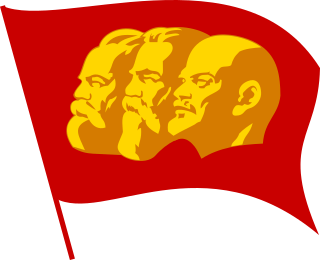Revolutionary Communist Centre of India (Maoist), was a communist group based in Punjab. RCCI(M) was formed in 1995, as the Revolutionary Communist Centre of India (Marxist-Leninist) was divided into two. The secretary of RCCI(M) was Shamsher Singh Sheri.

All Nepal Communist Revolutionary Coordination Committee (Marxist–Leninist) was a revolutionary communist movement formed in Nepal in 1975. ANCRCC(ML) had its roots in Jhapa District Committee of the Communist Party of Nepal as well as the Morang-based Nepal Revolutionary Organisation (Marxist-Leninist). In Jhapa armed struggle had been developed, inspired by the Naxalite movement in India.

Communist Party of Nepal (Soviet), was an underground political party in Nepal. It was founded 1978 by the All Nepal Communist Revolutionary Coordination Committee (Marxist-Leninist). The founding congress was held December 26, 1978-January 1, 1979. The first general secretary of CPN(ML) was C.P. Mainali.

The Coordination Committee of Maoist Parties and Organizations of South Asia (CCOMPOSA) is an umbrella organization of various South Asian Maoist parties and movements and its purpose is to coordinate their activities throughout South Asia.

Communist Organisation of India (Marxist–Leninist) was a political organisation in India. COI(ML) was formed in May 1985 through the merger of six different groups;
Committee to Defeat Revisionism, for Communist Unity was a small British Marxist-Leninist group that left the Communist Party of Great Britain in 1963. CDRCU was led by Michael McCreery, the son of General Sir Richard McCreery. CDRCU was sympathetic towards the Communist Party of China and the Party of Labour of Albania, with CDRCU members attending May Day celebrations in Tirana in May 1964. The group began publishing Vanguard in 1963.
Revolutionary Communist Organising Committee was a communist group in Nepal. The organ of the group was Rato Jhanda. The group was sometimes known as the Rato Jhanda group. The group had its origins in the faction led by Bharat Mohan Adhikari in the early 1970s, which was formed by a section of the Eastern Koshi Provincial Committee of the Communist Party of Nepal and a small splinter section of the Gandaki-based Marxist-Leninist Revolutionary Communist Party. However, this tendency had been deserted by Bharat Mohan, when he joined the Central Nucleus. Before constituting itself as the Revolutionary Communist Organising Committee, the group was called the Red Flag District Committee.
Revolutionary Communist Organisation, Nepal was a communist faction in Nepal. The group operated in the Bagmati, Janakpur and Koshi zones. The group publish Vargyuddha.
The Communist Workers League of Britain (Marxist–Leninist) (CWLB) was a Maoist political party in Britain.

Hoxhaism is a variant of anti-revisionist Marxism–Leninism that developed in the late 1970s due to a split in the Maoist movement, appearing after the ideological dispute between the Communist Party of China and the Party of Labour of Albania in 1978. The ideology is named after Enver Hoxha, a notable Albanian communist leader.
The Revolutionary Communist League of Britain was a Maoist political party in Great Britain, formed in 1977.

Anti-revisionism is a position within Marxism–Leninism which emerged in the 1950s in opposition to the reforms of Soviet leader Nikita Khrushchev. Where Khrushchev pursued an interpretation of Leninism that differed from his predecessor Joseph Stalin, the anti-revisionists within the international communist movement remained dedicated to Stalin's ideological legacy and criticized the Soviet Union under Khrushchev and his successors as state capitalist and social imperialist due largely to its hopes of achieving peace with the United States. The term "Stalinism" is also used to describe these positions, but it is often not used by its supporters who opine that Stalin simply synthesized and practiced Leninism.
Marxism–Leninism–Maoism, is a political philosophy that builds upon Marxism–Leninism and Mao Zedong Thought which was first formalised in 1988 by the Communist Party of Peru.

The Revolutionary Internationalist Movement (RIM) was an international Communist organization founded in France in March 1984 by 17 various Maoist organisations around the world. It sought to "struggle for the formation of a Communist International of a new type, based on Marxism–Leninism–Maoism". The RIM appears to be defunct as are many of the founding organisations and many changed their names over the years, or have dropped active armed struggle.

The International Conference of Marxist–Leninist Parties and Organizations (ICMLPO) is a grouping of parties and organizations adhering to Mao Zedong Thought. It is organized by a Joint Coordination Group and meets every two or three years.

A proletarian revolution is a social revolution in which the working class attempts to overthrow the bourgeoisie. Proletarian revolutions are generally advocated by socialists, communists and most anarchists.






